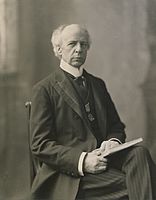8th Canadian Ministry facts for kids
Quick facts for kids 8th Canadian Ministry8e conseil des ministres du Canada |
|
|---|---|
8th ministry of Canada |
|
 |
|
| Date formed | 11 July 1896 |
| Date dissolved | 6 October 1911 |
| People and organisations | |
| Monarch | |
| Governor General | Marquess of Aberdeen Earl of Minto Earl Grey |
| Prime Minister | Wilfrid Laurier |
| Member party | Liberal Party of Canada |
| Status in legislature |
Majority |
| Opposition party | Conservative Party (historical) |
| Opposition leader |
|
| History | |
| Election(s) | 1896, 1900, 1904, 1908 |
| Legislature term(s) |
|
| Predecessor | 7th Canadian Ministry |
| Successor | 9th Canadian Ministry |
The Eighth Canadian Ministry was the group of top government officials led by Prime Minister Sir Wilfrid Laurier. This group, also called a cabinet, was in charge of Canada from July 11, 1896, to October 5, 1911. It was made up of members from the Liberal Party of Canada. This ministry was in power during four different periods of the Canadian Parliament.
Contents
What is a Cabinet?
A cabinet is like a special team of leaders who help the Prime Minister run the country. Each member of the cabinet, called a minister, is in charge of a specific area. For example, there's a Minister of Finance who handles money, and a Minister of Agriculture who deals with farming. Together, they make important decisions for the country.
Meet Prime Minister Wilfrid Laurier
Sir Wilfrid Laurier was the Prime Minister who led the Eighth Canadian Ministry. He was a very important leader in Canadian history. Laurier was Prime Minister for a long time, from 1896 to 1911. This means he was in charge for over 15 years! During his time, Canada grew and changed a lot.
Key Roles in the Cabinet
The cabinet had many important jobs, with different people holding these roles over the years. Here are some of the main ones:
- Prime Minister: This is the top leader of the country. Sir Wilfrid Laurier held this role for the entire time of this ministry.
- Minister of Agriculture: This person was in charge of farming and food production in Canada. Sydney Arthur Fisher held this role for the whole period.
- Minister of Finance: This minister managed Canada's money and economy. William Stevens Fielding was the main person in this role.
- Minister of Justice: This person was responsible for the country's laws and legal system. They also served as the Attorney General. Several people held this position, including Oliver Mowat and Charles Fitzpatrick.
- Minister of the Interior: This role was very important for managing Canada's vast lands, natural resources, and Indigenous affairs. Clifford Sifton and Frank Oliver were key ministers here.
- Postmaster General: This minister oversaw the postal service, making sure mail was delivered across the country. William Mulock was a long-serving Postmaster General.
- Minister of Public Works: This person was in charge of building and maintaining public buildings and infrastructure, like roads and bridges.
- Minister of Railways and Canals: This role was crucial for developing Canada's transportation networks, which were very important for trade and travel.
Many other ministers were part of the cabinet, handling areas like customs, defence, and trade. Each minister played a part in helping Sir Wilfrid Laurier govern Canada during this busy time.
Years in Power and Parliaments
The Eighth Canadian Ministry was in power for a long time, covering four different Canadian Parliaments:
- The 8th Canadian Parliament
- The 9th Canadian Parliament
- The 10th Canadian Parliament
- The 11th Canadian Parliament
This means that the government was re-elected several times during Laurier's leadership, showing that the people of Canada supported his party.
| Ministries of Canada | ||
|---|---|---|
| Preceded by 7th Canadian Ministry |
8th Canadian Ministry 1896–1911 |
Succeeded by 9th Canadian Ministry |
 | Stephanie Wilson |
 | Charles Bolden |
 | Ronald McNair |
 | Frederick D. Gregory |

